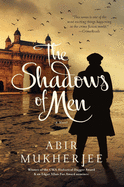
The politics and culture of colonial India in 1923 make for an intriguing setting for The Shadows of Men, as Edgar finalist Abir Mukherjee (Smoke and Ashes) skillfully illustrates the unrest and tensions that marked Calcutta during this era.
In their fifth superb outing, Captain Sam Wyndham and Sergeant Surendranath Banerjee of the Imperial Police Force are caught up in the violence permeating Calcutta before upcoming elections, called by the British following Mahatma Gandhi's incarceration. A "nasty territorial dispute" erupts between two "native gangs," but the main problems are the tensions between Hindus and Muslims, upper and lower castes, landowners and peasants that have "bubbled to the fore," and which the British plan to exploit. To gain more information, Lord Taggart, the Calcutta commissioner of police, gives an undercover assignment to Surendranath--keep tabs on Muslim politician Farid Gulmohamed, who officials fear may further exacerbate the uprisings. Nicknamed "Surrender-not" because his British superiors refuse to learn how to pronounce his name, Surendranath accepts, despite being offended. He knows Taggart, the other British, even Sam, don't understand that "while we all might look the same to him, a Hindu following Gulmohamed into the Muslim parts of town would stick out." The surveillance goes wrong, with Surendranath suspected of murdering a Hindu religious leader, so Sam digs into his investigative skills to exonerate Surendranath.
Mukherjee's action-packed thriller delivers a vivid look at the era, tensions among the various groups, and the British system that kept India in subjugation, set against Calcutta's "eternal shroud of industrial smog." --Oline H. Cogdill, freelance reviewer

